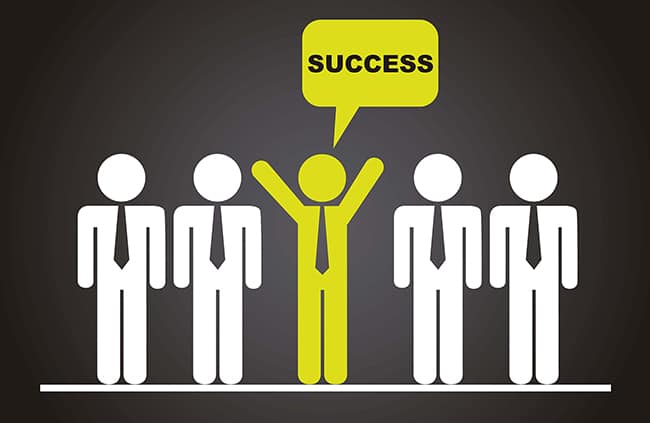The 5 Mistakes To Avoid When Creating Great Business Relationships That Will Reward You For Life…
And NO! We’re not only talking about financial rewards, but that comes from great relationships too!

A couple of years ago, While campaigning in Roanoke Virginia, Pres. Obama stirred up a lot of controversy with a business comment.
He offended many entrepreneurs by suggesting that they didn’t build their own businesses when he said…
“Somebody helped to create this unbelievable American system that we have that allowed you to thrive. Somebody invested in roads and bridges. If you’ve got a business – you didn’t build that. Somebody else made that happen. The Internet didn’t get invented on its own. Government research created the Internet so that all the companies could make money off the Internet.”
Entrepreneurs all over the world went crazy because they felt that he was discounting their hard work.
I didn’t.
I understood exactly what he was saying. Most people didn’t see or pay attention to the second part of the quote below:
“The point is, is that when we succeed, we succeed because of our individual initiative, but also because we do things together. There are some things, just like fighting fires, we don’t do on our own.”
Politics aside (and please don’t leave political comments below because we’ll just have to delete them), the point is that we don’t do anything alone.
Every great entrepreneur who has found lasting success will admit quickly that without relationships — business, personal, and family, no one succeeds with any degree of fulfillment in their lives.
This is a business blog so we’re going to focus on business relationships today. And with any business strategy, there are rules to building relationships in business.
We’ll focus on the 5 mistakes that we’ve uncovered (and made).
Even the most introverted business owner can build meaningful relationships if she avoids these mistakes.
But first you have to establish The Goal.
The goal in any relationship is to build trust with mutual respect. For relationships to be successful, both of these elements must be present, not just one.
For example, if you have engaged with a partner on a project because you know that she has a great system, expertise and reputation in that niche, that might seem like enough to move forward with a long-term relationship.
But if she drags her feet when deadlines approach causing stress, the results will suffer.
You may decide that you respect her but don’t trust her.
There are multiple levels of business relationships.
As the captain, you’re always building a team.
Finding the right people to put on your “team” is a tricky proposition.
The team consists of:
- Customers
- Vendors
- Partners
Customers
One of my mentors, Alex Mandossian, said that you always need to know your top 20% of customers. They’re the ones who spend money with you because they know, like and trust you more than the rest.
They also get the most attention.

Creating a personal relationship with those special people makes sense, but you must leave little room for others to work their way into that group as well. Otherwise, the opportunity for growth in your organization is limited – even for customers.
The top 20% is important because they generate 80% of your business.
And as you build the relationship with those customers, they feel some ownership in your business. They could lose if your business isn’t around any longer to serve them.
They are not stockholders, but stakeholders.
Of course, all customers must feel like you have their best interest at heart, and you do we hope. But your time is limited, and you can only invest real, one-on-one time in the top customer relationships.
Vendors
Who is a vendor?
This is the company that provides the infrastructure software for your business, the virtual assistant who helps you get stuff done every day, the programmer that creates your products and software, the social media manager who translates your voice into Facebook, Twitter and Instagram posts, and many other workers.
They represent you in some ways to the public or they help you access the public. These folks are incredibly important to you, and if your relationship is not good, the damage can be great.
A vendor can actually become a trusted advisor, but only after you’ve built a really strong relationship with a lot of respect and trust.
Partners
Partners can be the lifeblood of your business. Or, they can become the bane of your existence.
In a previous business, I once had a senior sales manager who was incentivized with a 10% sales commission on top of her weekly pay.
Everything was cooking along as I had hoped and expected until one Friday afternoon, I received a phone call from her.
 She told me she was cleaning out her desk and would be gone by 5 o’clock that afternoon. Basically, she was walking away with half of my clients and a third of my content providers.
She told me she was cleaning out her desk and would be gone by 5 o’clock that afternoon. Basically, she was walking away with half of my clients and a third of my content providers.
While I was trusting her, and giving her access to my proprietary information and systems, she was quietly stealing part of my business over a period of two months.
Today, my partners become partners with a lot more scrutiny.
Those relationships have safeguards to prevent that kind of sabotage from inside.
Great partners can become your best resources. Once trust and respect are established thoroughly, a partner can become a godsend.
NAMS was built with hundreds of partners. Affiliates, speakers, joint venture partners, instructors, and advisors were the folks who drove the engine that powered NAMS for years.
That’s one of the reasons that we believe in lifetime referral commissions. Partners promote so that we can reward them for years to come. Frankly, our business would not exist without them. So our relationship is incredibly important.
The 5 relationship mistakes that we discuss below apply to all three categories: customers, vendors and partners.
What are the 5 mistakes that we’ve uncovered?
- You know what they say about assumptions.
- Give and let give.
- Relationships are an 80-20 proposition.
- Fool me once, shame on you; fool me twice, shame on me.
- Expect long-term relationships, otherwise what’s the point?
You know what they say about assumptions.
“Apples don’t fall far from the tree.”
“First impressions are usually correct.”
“If you want to know what your wife will be like in 30 years, look at her mother.”
“Don’t get too excited. You’ll just be disappointed.”
These and most clichés people accept as truth are ridiculous stereotypes.
We try to use judgments – or prejudgment in most cases – as a way to protect ourselves in situations outside our comfort zone.
But if you go into a situation believing those prejudices are true, they will definitely become true.
Assuming that someone has a flawed characteristic or quality before we see it, is like walking through a field of cow patties.
You’re bound to step in one at some point, and it will confirm your belief that the world stinks.
If you assume that a person you’re trying to do business with is out to get you, then you won’t be surprised when that happens.
And you can feel self-righteous saying, “see, I knew I shouldn’t have trusted that person.”
Making assumptions about the other person is probably the fastest way to destroy a relationship quickly, or even eliminate the possibility of having a relationship.
An assumption confirms that you don’t respect them, and they should never expect you to trust them.
Making assumptions about someone automatically keeps someone at arm’s length as if you were saying, “I’m better than you, I know more than you, I’m your boss, and you’ll never be better than my expectations – which are very low.”
Give and let give.
This is the opposite of assumptions.
With this attitude, the sky’s the limit for the relationship. You’re giving the other party carte blanche.
Even though this can be a great way to find highly motivated people, not every valuable relationship is with a person who is highly motivated.
If not, the other party in the relationship can be completely freaked out.
We recently hired a project manager to run the many MyNAMS projects. As a team, we were excited to be able to work with someone who had experience, time, and it seemed a great understanding of where we want to go. She also had the proven ability to drive those projects forward.
We questioned her thoroughly. We asked if she felt like this was a good fit for her. We told her of the growth potential in the company and the job. And we laid out the responsibilities that would come along with this opportunity. And finally we told her of the bonus structure based on performance.
Essentially, she could build the job anyway she wanted as long as we met our company goals. We even told her we were concerned that she would not get the kind of career growth that she wanted with us.
She was all in. Excited. Eager to get to work.
Two weeks later, she quit. She was completely overwhelmed by our business, she said.
I was stunned that she quit. And I learned that not everyone responds positively to too much freedom.
Relationships are an 80-20 proposition.
My dad told me this about marriage and it fits here too:
“Relationships are and 80-20 proposition, and both parties give 80.”
Ok, that doesn’t make any sense, right? How can both parties give 80%?
They can’t. But they can try.
If both parties in a business relationship are all about making sure the other party is getting more from the relationship, then they are in an 80-80 relationship.
 It’s often represented by the question:
It’s often represented by the question:
“How can I help today?”
When I was a consultant, I had two main clients, both VP’s at a huge Fortune 10 company. Both of those clients loved me.
The first loved “just knowing I was in the building…” because she knew that she could rely on me to dig into issues and bring back solutions and ALWAYS have her best interest at heart.
The second loved me because I always gave him a different and more simplified perspective on complex issues because he could get in the weeds pretty quickly. I stayed at the Big Picture level because that’s the perspective that served him best.
Those clients rewarded me with 17 years of consulting contracts that exploded my value to them and my family.
If that question (How can I help today?) comes from a person that you trust and respect, then you’re happy to tell them exactly how they can help you today. And tomorrow, you’ll ask them how you can help them.
Until that trust and respect is built, the question is often met with suspicion. And the answer is usually, “thanks, but I got this.”
Fool me once, shame on you; fool me twice, shame on me.
This saying rules my life:
“If I’m not the problem, there is no solution.”
 This is a radical concept to a lot of people.
This is a radical concept to a lot of people.
Even when somebody takes advantage of you, the only person you can blame is yourself.
I know this is a hard thing to wrap your head around, especially when you’ve been wronged.
Yet, at this point you, have two choices:
- Get angry, blame the other party, and call your lawyer to figure out how to sue the person. That hijacks all your energy, or…
- Take a look at your part in the problem, and vow that you will never make that mistake again.
You are the only one that you can change.
You can’t change anyone else, even though they may need to change.
You can’t right a wrong, no matter how justified. All you can do is learn from it and move on.
So, if someone fooled one time, you can easily say no thanks to a second dose of that same mistake.
Learning from your mistakes in relationships eventually clears a path for a much happier life.
Expect long-term relationships, otherwise what’s the point?
Every engagement, every project, every hire is an opportunity to build a long-term relationship.
Short-term relationships are expensive and frustrating.
People often say to hire for specific task, let them go, and never look back.
But the consequences of that are kind of severe.
First, you’re building a reputation. The result is that you will never ever get the benefit of the doubt or the benefit of the deal from a vendor or partner or even a customer when you are bouncing from relationship to relationship.
Second, consistency and continuity suffers when you’re always looking for the next person you can use. Your business will suffer, look disjointed and confusing.
Every relationship conversation, whether it’s with customers, vendors, or partners, should begin with the phrase, “I’m looking for long term relationships…”
And you should mean it.

What tactics or guidelines did I miss in building meaningful and lasting relationships?